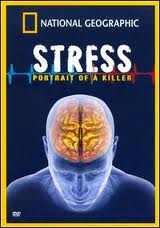
Let’s break it down a little bit. If you don’t know what a stress response is, it’s what people often refer to as our ‘fight or flight’ response. It’s what animals and people use as a way to save their lives if they sense immediate danger; immediate danger being anything from a possible animal attack to a mugging. Real life-or-death type stuff! What actually happens during this response? There are two hormones that work with the stress response and those are adrenaline and glucocorticoids (which comes from the adrenal glands). These are the backbones of our stress response. This response is meant to help us survive and our body begins to focus on the basics. Our lungs work overtime to get more oxygen, the heart races to get the oxygen through the body and muscles are able to respond instantly. Every other body function becomes secondary. However, the trouble is that this response may kick in for you at times when you’re not actually in immediate danger. Maybe you’re about to give a presentation to a new work client or get on a plane. These situations, while they may cause some nerves, are not the kind of situations that warrant a full-blown stress response. And it seems more and more people are now experiencing this stress response in their daily lives. This response now comes on due to psychological fears and we are lacking the ability to effectively turn it off!
And here’s another interesting tidbit- our “rank” in life can be a factor in how much stress we have in our lives. After discovering that the rank of a baboon in the hierarchy of its clan directly affected the amount of stress it had, a study was then conducted on humans and found a similar link. The lower “rank” or position we have in our jobs, the more stress we feel. The higher we are, the less stress.
So now we know what stress is and what it looks like and feels like in our bodies. But what happens when we overstress and don’t shut off our stress response? What about the affects we don’t immediately feel? Here’s where all our stress-related illnesses come in. High blood pressure, ulcers, migraines, stomachaches… you name it. Because, as you know now, when our stress response is kickin’ it in high gear, few other body functions are running as scheduled. And that includes our immune system. It also includes our cardiovascular system. You can actually see the impacts of stress on our internal systems! And mentally, stress makes us miserable. Under stress, we become irritable, tired and forgetful.
So what started out as something built in to protect us, has now developed into something that (when not controlled) can hurt us.
This documentary was really interesting. We all know stress is bad when it’s overwhelming, but it’s so powerful to understand exactly what it’s doing to our bodies and minds. Check it out to learn more about their stress findings and the long-term impacts it can have in our lives if we don’t start to work on it now.
Xo b

 RSS Feed
RSS Feed
